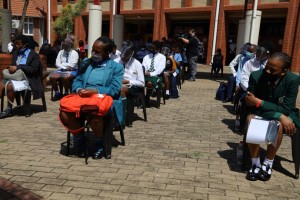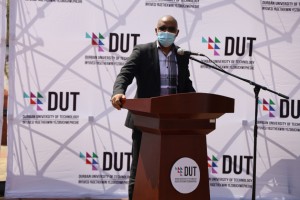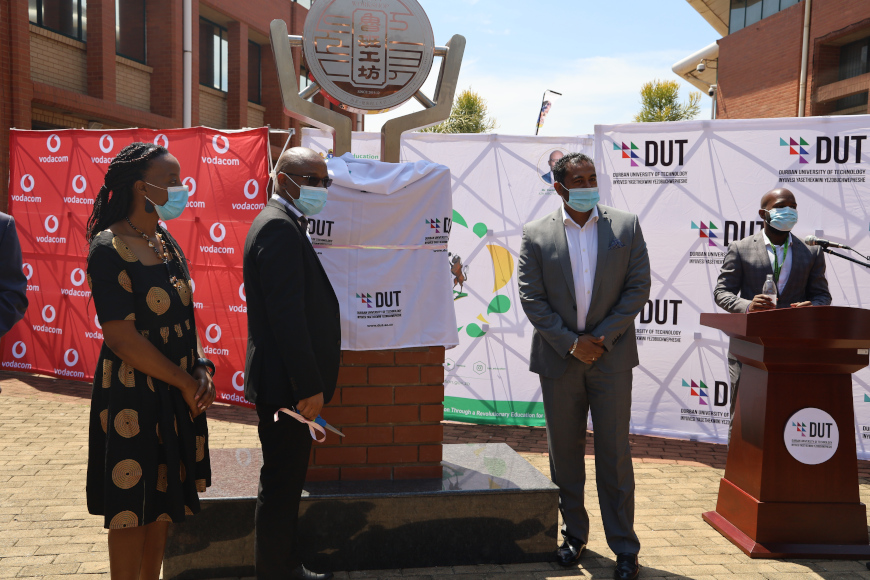Durban University of Technology welcomed 300 girls from the deep rural schools across KwaZulu-Natal to embark on a five-day training programme to acquire skills in coding and robotics.
 DUT in collaboration with its partners: KwaZulu-Natal (KZN) Department of Education, Vodacom and Centre for the Advancement of Science and Mathematics Education (CASME) held an opening ceremony of the 2020 Code Like A Girl programme at DUT’s Ritson Campus on Monday, 7 December 2020.
DUT in collaboration with its partners: KwaZulu-Natal (KZN) Department of Education, Vodacom and Centre for the Advancement of Science and Mathematics Education (CASME) held an opening ceremony of the 2020 Code Like A Girl programme at DUT’s Ritson Campus on Monday, 7 December 2020.
The training conducted to help the young girls to one day thrive as Science, Technology, Engineering and Mathematics (STEM) entrepreneurs and executives resumed on Monday, 7 December 2020 and is expected to come to an end on Friday, 11 December 2020.
Welcoming the girls was DUT’s Deputy Vice-Chancellor: Research, Innovation and Engagement, Professor Sibusiso Moyo who said coding is a key area because it gives one many ways, not just of thinking using logic but also providing solutions.
Speaking briefly on DUT, Prof Moyo said it has over 30 000 students at the university and hoped the girls will choose DUT after the training.
She acknowledged KZN Education MEC, Kwazi Mshengu and his team for their passion on education and for ensuring that this project involving 300 girls from different schools is a success. Prof Moyo thanked Vodacom KZN Managing Executive, Chris Lazarus and his team for playing a big role in initiating this project and Henre Benson from CASME, an NGO that does a lot of work in schools, working with teachers in advancing Science and Mathematics education.
Recognising the DUT team behind this project, Prof Moyo expressed her appreciation to the Executive Dean of the Faculty of Accounting and Informatics, Prof Oludayo Olugbara, Chief Information Officer, Dr Progress Mtshali, Director for Enterprise Development and Short Courses Prof Surenda Thakur and Head of Department for Information Technology, Dr Jeanette Wing and the project leader who is a Senior IT Lecturer, Ebrahim Asmal.
“Recently there was a research produced which looks at Boosting Gender Equality in Science and Technology. If you look at participation of rates, it is well known that in certain fields, engineering, mechanical engineering and well as some of the areas which are technical, information technology and computing, the representation of women and girls is not as much. You start off with a number of girls but as you progress to higher degrees, postgraduate studies, the numbers fall quite a bit. What they try to find out is what is it that makes it difficult for girls to advance? Some of the reasons is exposure to the curriculum itself,” said Prof Moyo.
She said DUT hopes that this programme will help the girls to have an idea of what else is out there in terms of the technology area, so they can have a variety of career choices.
 KZN Education MEC, Mshengu assured both Prof Moyo and Lazarus that in the DoE they have a reliable partner.
KZN Education MEC, Mshengu assured both Prof Moyo and Lazarus that in the DoE they have a reliable partner.
He said they are guided by the desire to build a prosperous for their learners and whenever they spot opportunities to venture into, they do not hesitate to tap into that space.
“DUT is almost our second home now and we will continue to seek to exploit your resources, both in terms of physical and intellectual resources. We do need to tap into the intellectual base, in building the type of education system that we want. There is no country that can be successfully led without a new information and knowledge base that you are producing. We will continue to rely on you and let’s hope we will take this partnership to greater heights,” said Mshengu.
Vodacom’s Lazarus said the aim of the project is putting what is academic in action.
“We are taking you through this week of a study programme which is going to be interactive. This week we will get to teach you something you have never done in your school curriculum and that is to learn how to code. I don’t know how to code and I am curious to hear your parents’ response when you tell them what you have learnt. We are embarking on something that is huge in KZN. I am hoping by end of this week, we start to solve some of the problems that we have as a province, the country and the continent,” said Lazarus.
Benson from CASME said it’s a privilege for CASME to be part of the joint effort, that brings together, government, business, civil society for this initiative.
He urged people to not forget the purpose of the course, which is championing girls and coding education for girls.
“We witness as an organisation first-hand how the lack of access to information technology, science equipment in schools, stand as a barrier for young girls as they strive to gain 20th century skills and also as they strive for equality and strive for an empowered, independent and liberated life. A life where choices are theirs, filled by knowledge skills and ultimately economic emancipation. Our efforts here are part of a bigger picture and that bigger picture is also about the struggle against gender based violence,” said Benson.
The selected girls were also given a chance to see the beauty of Durban and enjoy the sea breeze since they were housed at Elangeni Hotel for the entire week.
Pictured: DUT’s Deputy Vice-Chancellor: Research, Innovation and Engagement, Prof Sibusiso Moyo, KZN Education MEC, Kwazi Mshengu, Vodacom KZN Managing Executive, Chris Lazarus and Vodacom’s Banele Shabalala at the opening ceremony of the 2020 Code Like A Girl programme.
Pic 2: Some of the 300 girls selected to attend the 2020 Code Like A Girl programme at DUT.
Pic 3: KZN Education MEC, Kwazi Mshengu addressing the people at the Code Like A Girl opening ceremony.
Simangele Zuma


